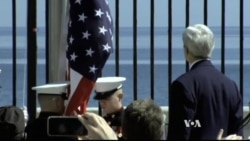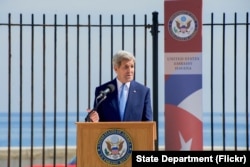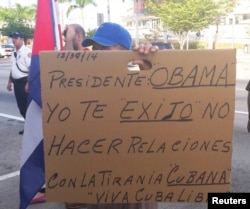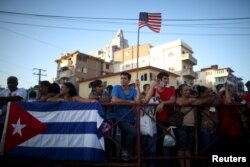U.S. Secretary of State John Kerry said Friday that a new U.S.-Cuban committee would begin talks next month on the "full normalization" of bilateral ties, building on historic ceremony earlier in the day in which the American flag was raised above the U.S. Embassy in Havana for the first time in more than 54 years.
At a joint news conference in Havana with Cuban Foreign Minister Bruno Rodriguez, Kerry said the path toward fully normal relations would depend in part on the lifting of the trade embargo with Cuba that the United States imposed more than 50 years ago. President Barack Obama supports that move, but faces opposition from many conservatives in Congress.
Kerry also played down any concerns about whether the next U.S. president, whoever is elected in November 2016, might roll back or reverse the Obama administration's policy of engaging Cuba.
Speaking about the new U.S.-Cuban committee, Kerry said it would begin discussing issues of mutual concern, including human rights, in September.
He said he believed the Communist island "would be best served by a genuine democracy, where people are free to choose their leaders, express their ideas, and practice their faith; where the commitment to economic and social justice is realized more fully; where institutions are answerable to those they serve; and where civil society is independent and allowed to flourish."
Rodriguez said the two countries will continue to have profound differences on human rights and certain other issues. He defended Cuba's human rights record, which has been repeatedly criticized by independent rights groups, and contrasted it with a wave of controversial police shootings in the United States.
"Cuba isn't the place where there's racial discrimination, police brutality or deaths resulting from those problems," he said.
He also jabbed at the U.S. policy of detaining Islamist extemists at its Guantanamo Bay military base in Cuba. "The territory where torture occurs and people are held in legal limbo isn't under Cuban jurisdiction."
Rodriguez laid out conditions that he said were “essential” to fully normalize ties. “The total lifting o the blockage – or the embargo as you say – as well as the return of the territory occupied illegally by the Guantanamo Naval Base and the compensation to our people for human and economic damages.”
Flag raised
Earlier Friday, Kerry saluted the American flag as it was raised again in Havana during a ceremony at the U.S. Embassy.
"This is truly a memorable occasion," Kerry said, "a day for pushing aside old barriers and exploring new possibilities."
Despite the recent diplomatic moves, Kerry said it would be "unrealistic to expect normalizing relations to have a transformative impact" on the Cuban government in the short term.
"Responsibility for the nature and quality of governance — and accountability for it — rests, as it should, not with any outside entity, but solely with the citizens of this country," Kerry said. "But the leaders in Havana — and the Cuban people — should also know that the United States will remain a champion of democratic principles and reforms."
He said the U.S. would continue to urge the Cuban government "to fulfill its obligations under U.N. and Inter-American human rights covenants — obligations shared by the United States and every other country in the Americas."
Ceremony details
Noting that he is the first U.S. secretary of state to visit Cuba since 1945, Kerry said he "felt very much at home" in the Havana embassy. He addressed an audience of officials from both governments and a large crowd of onlookers on a sun-drenched day in the Cuban capital.
The crowd stood as both countries' anthems were played during the ceremony.
Kerry stood beside the flag during the ceremony in an embassy courtyard overlooking the Caribbean seaside. He paid tribute to last year's decision by Obama and Cuban President Raul Castro to restore the diplomatic ties severed at the height of the Cold War.
"President Obama and President Castro made a courageous decision to stop being prisoners of history and to focus on the opportunities of today and tomorrow," Kerry said.
Kerry was accompanied in Havana by some members of Congress and three elderly U.S. Marines — Larry Morris, Mike East, and Jim Tracey, now retired — who lowered the flag for the last time in Havana in January 1961.
"Larry, Mike and Jim had done their jobs, but they also made a bold promise — that one day they would return to Havana and raise the flag again," Kerry said. "At the time, no one could have guessed how distant that day would be."
Former President Dwight Eisenhower closed the U.S. Embassy during his last weeks in office before John F. Kennedy was inaugurated as his successor in 1961.
Dissidents not invited
A senior U.S. official said Cuban dissidents were not part of the morning flag-raising ceremony at the embassy, because "it is principally a government-to-government event signifying this new relationship" between Havana and Washington.
Members of Cuban civil society, including political, human rights and media activists, have been invited to a second, larger ceremony later in the day at the residence of the chief of the U.S. mission in Cuba, Jeffrey DeLaurentis. Obama has not yet appointed an ambassador to Cuba.
'A fairy tale'
A Cuban-American human rights advocate based in Washington said the U.S. move to normalize relations with Cuba might be a setback for Cuban dissidents.
“It is a fairy tale to assume that just because the president [Obama] makes concessions to Raul Castro, then Raul Castro will behave and stop abusing the people of Cuba,” said Frank Calzon, head of the Center for a Free Cuba.
Citing the Cuban government’s continued arrests of anti-government protesters and dissidents, he said the Castro government has been “emboldened” because it has not been pressured by the U.S. to improve human rights.
In a letter to the secretary of state this week, Reporters Without Borders noted that Cuba ranks 169th out of 180 nations on its 2015 press freedom index.
But Arizona Senator Jeff Flake, a Democrat, told VOA that he believes it will be easier to address the concerns of dissidents now that the U.S has diplomatic representation in Cuba.
"I think we have better days ahead for civil society in Cuba," he said. "I think there is going to be increased political space and, you know, better days are ahead."
U.S. lawmakers' reaction
Some U.S. lawmakers and prominent politicians have questioned the Obama administration’s decision to move forward with engagement, in the wake of human rights concerns.
Florida Senator Marco Rubio, a 2016 Republican presidential candidate, strongly criticized the current U.S policy on Cuba.
Another Republican candidate, former Florida Governor Jeb Bush, also criticized the move.
“We [the U.S.] are so hungry for this deal that we are willing to overlook a hundred peaceful dissidents arrested just a few hours before the opening of our embassy,” said Representative Ileana Ros-Lehtinen of Florida, a Cuban-American.
“It is a cruel insult to the freedom-loving people of Cuba, and it is a dangerous situation for U.S. national security,” Ros-Lehtinen said in Miami.
But other lawmakers have offered support, including House Democratic leader Nancy Pelosi, who expressed hope for a more productive relationship between the two nations.
Vermont Senator Bernie Sanders, a 2016 Democratic presidential candidate, praised the Obama administration's Cuba policy.
Increased travel to Cuba
The embassy reopening will allow more Americans to travel to Cuba and give Cuban residents increased access to the U.S. Embassy in Havana, but most people on the island may not see much of an immediate difference in their day-to-day lives.
“In the immediate short term, it won’t benefit the ordinary Cuban[s] very much, except to give them some hope,” said Philip Brenner, an international relations professor at American University in Washington who has traveled to Cuba more than 30 times.
Brenner said Congress would need to lift the U.S. trade embargo on Cuba for significant changes to take place.
"We are all aware that, notwithstanding President Obama’s new policy, the overall U.S. embargo on trade with Cuba remains in place and can only be lifted by congressional action — a step we strongly favor," Kerry said Friday.
“Lifting the embargo would make the greatest change in the shortest time. I don’t agree with their [the Cuban government's] suppression of dissidents. I don’t agree with their censorship, and I have told them that. If we lift the embargo, they no longer can blame everything on us, and I think change will come far more rapidly," U.S. Senator Patrick Leahy told VOA.
Sam Verma contributed to this report










